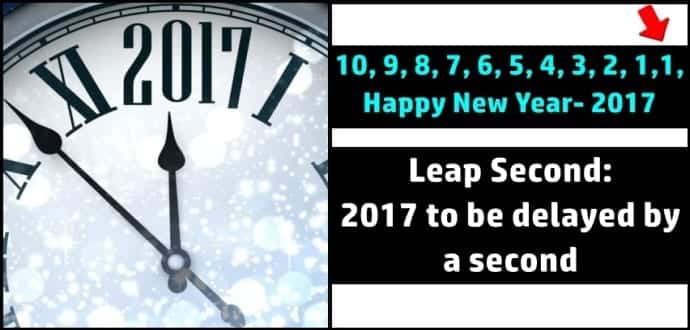Hold up your new year celebrations! 2016 will be a second longer
You may have to hold your new year celebrations for a little bit longer, by a whole second. With just more than a day to go for the year 2016 to come to an end, the countdown to 2017 will last one second longer than the 11:59:60 mark tomorrow. According to scientists, the “leap second” is needed to compensate for a slowdown in the Earth’s rotation and to ensure that our clocks stay exactly in sync with Earth days.
“This extra second, or leap second, makes it possible to align astronomical time, which is irregular and determined by Earth’s rotation, with UTC which is extremely stable and has been determined by atomic clocks since 1967,” the IERS (International Earth Rotation and Reference Systems Service) at the Paris Observatory said in a statement.
Countries that use Coordinated Universal Time, which include several West African nations, Britain, Ireland and Iceland will add the leap second during the midnight countdown to 2017 making the year’s final minute of 2016 will last for 61 seconds long. For others, the timing will be determined by the time zone they live in, relative to UTC.
“The sequence of dates of the UTC second markers will be: 2016 December 31 23h 59m 59s, 2016 December 31 23h 59m 60s, 2017 January 1, 0h 0m 0s,” the IERS website states.
The IERS in Paris decides when leap seconds are needed, and they are always announced about six months in advance. This is done because the extra second can be a nightmare for communication networks, financial systems, and other applications that depend on exact timing, so they need to be programmed into computers to prevent mistakes.
Peter Whibberley, a senior research scientist at the National Physical Laboratory in Teddington, said: “Leap seconds are needed to prevent civil time drifting away from Earth time.
“Although the drift is small – taking around 1,000 years to accumulate a one-hour time difference – if not corrected it would eventually result in clocks showing midday before sunrise.”
Dr.Leon Lobo, of NPL’s time and frequency group, said: “Most people won’t even notice, although everyone will probably be celebrating New Year a second too early this year.
“People might also notice problems with mobile phone networks as they work on atomic time and, with the increased traffic on New Year’s Eve, there could be potential issues.
“Inserting a leap second is necessary because the Earth is wobbling and slowing down and over time that divergence could cause problems.”
This will be the 27th time that the leap second has been added to clocks in history since it’s introduction in 1972, which means that over the past 44 years everyone has gained 27 seconds. The last leap second was added 18 months ago on June 30, 2015.
To sum it up, you will need a wait a second longer to bid adieu to the Year 2016 and welcome 2017.
